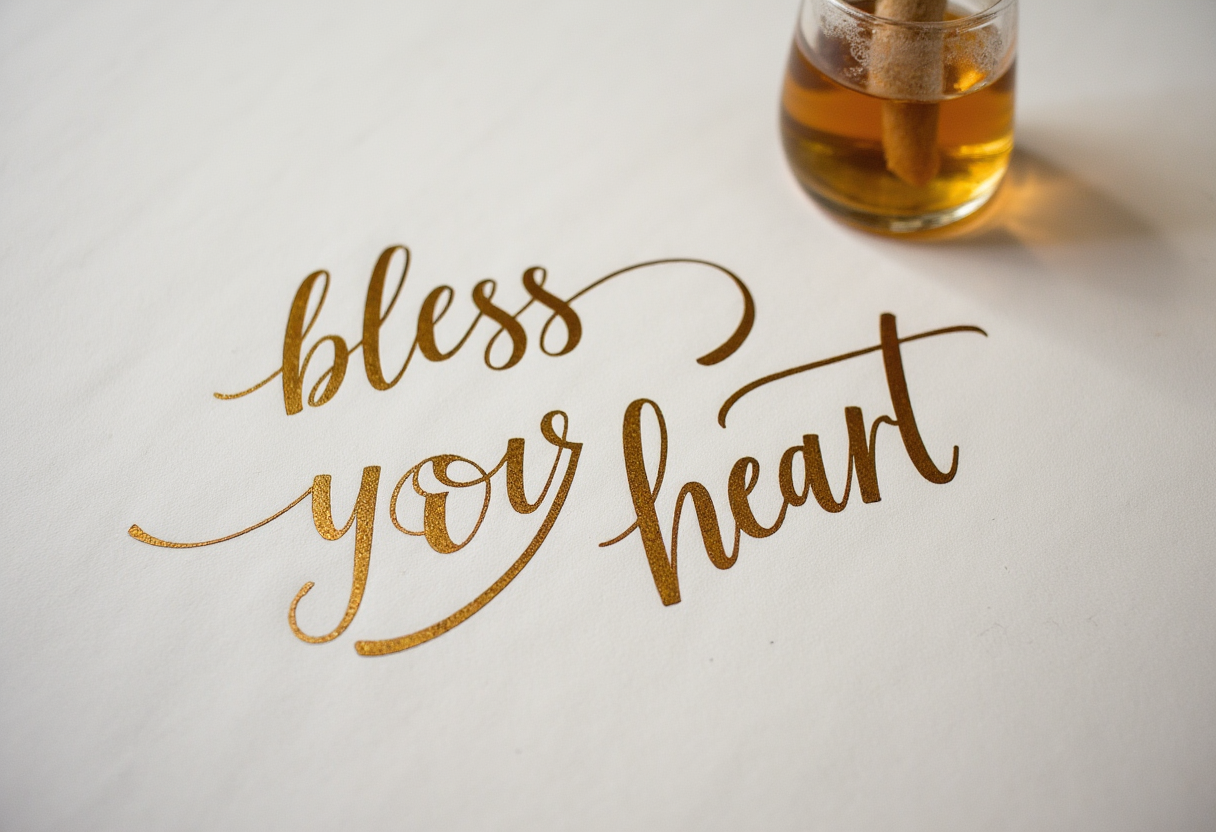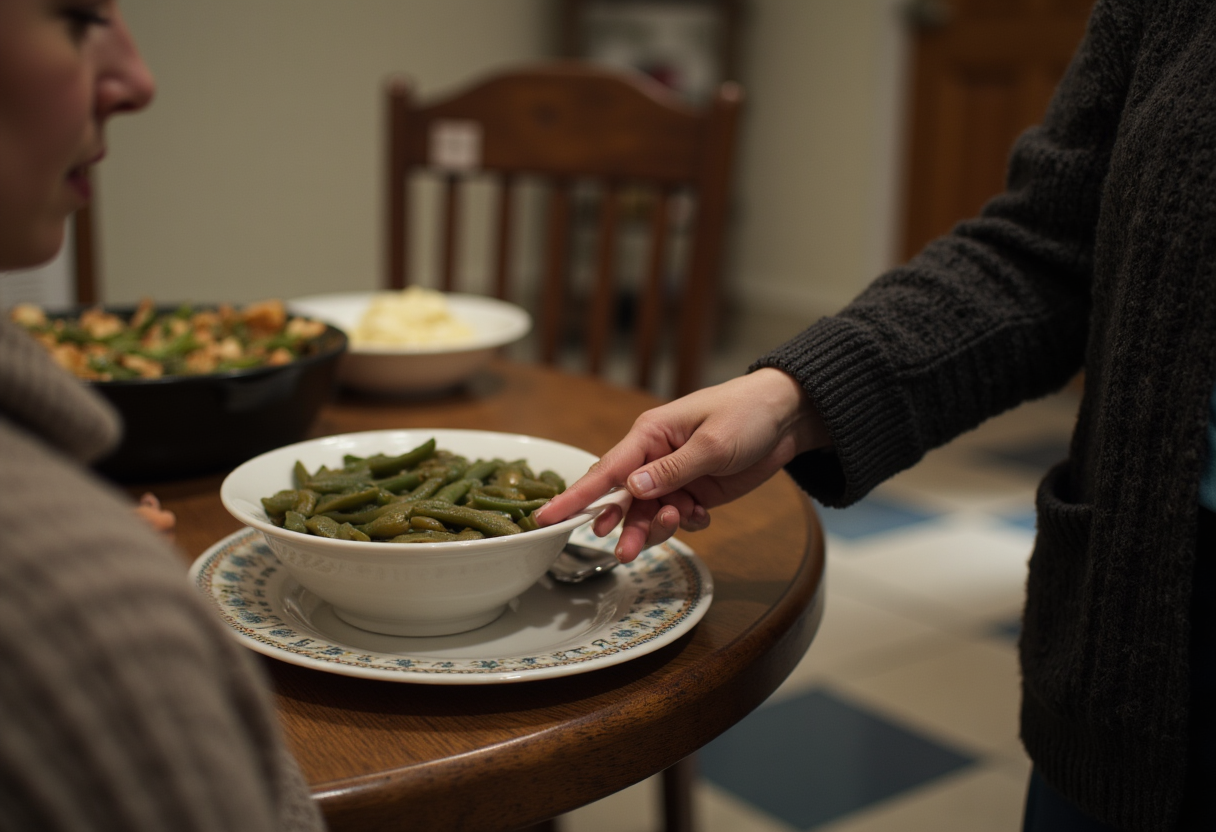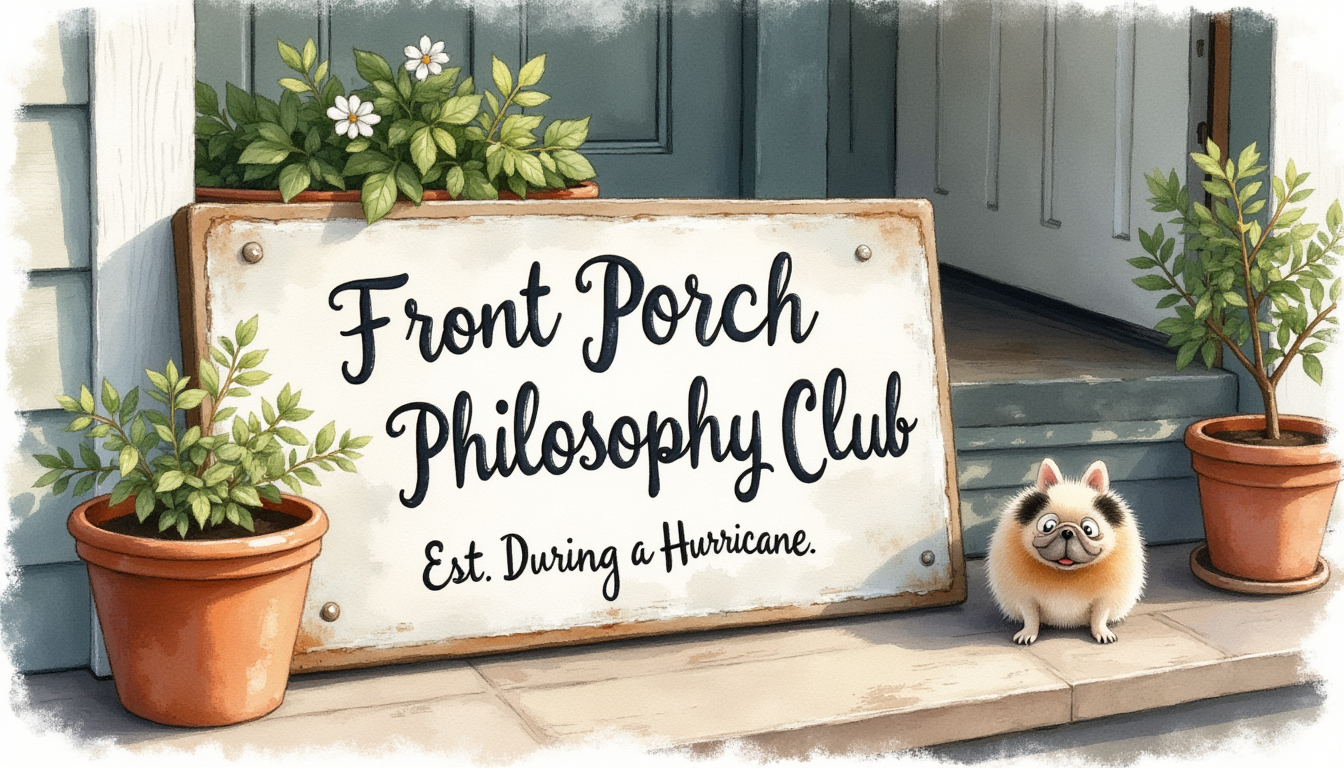"Southern Sayings Decoded: Your Essential Translation Guide"
"A beautifully crafted phrase like 'bless your heart' written in elegant, Southern-style script
In the South, language isn’t just a way to talk—it’s a way to live. Southern sayings are the small talk, the advice, and sometimes the warning tucked into a single, perfectly-delivered line.
Words land with intention, like honey dripping off a biscuit; how you say something often matters more than what you actually say.
Down here, a well-aimed “bless your heart” can detonate like a grenade or settle you like a rocking chair on the porch—depending on who’s speaking, how they say it, and how long they’ve been nursing that sun tea.
I learned early that southern sayings weren’t just charming phrases thrown around for flavor—they were survival tools: codewords, gentle combat, and a way to read the room without raising your voice.
Like the time Aunt Fannie Lou patted my arm with that tight-lipped smile and called me “precious” after I showed up to a church potluck with instant mashed potatoes.
The steam from the green bean casserole still rose in the air; I remember the smell of cornbread and the quiet, polite roasting that followed.
If you’re new to the South—or just trying to avoid offending someone’s meemaw—pull up a chair. Read on for translations and quick examples of the insults, business-ready phrases, hyperbole, and manners that make up this particular way of speaking.
It’s more than vocabulary. It’s culture with a sugar crust and a buttered bun—passed down from porch to post, from fishing trips to family tables. Learn a few, and you’ll understand a little more of the life behind the language.
When Nice is a Knife: Insults in Disguise
Southern manners are famously sweet, but don’t let the sugar fool you — tucked inside those niceties are some of the sharpest jabs you'll ever get. We don’t often raise our voices; we smile and deliver the cut with style.
These phrases are more than colorful turns of phrase — they’re coded social signals, much like the fables in Sharing Fables Is More Critical Than Ever, carrying practical wisdom and cultural memory.
“Bless your heart.” Literal meaning: a sympathetic blessing. Typical use: can be genuine sympathy or, far more often, a polite sting meaning “you poor, clueless thing.” Tone cue: listen for the context and the smile — mid-gossip, it’s a warning.
Example: “She brought store-brand sweet tea to the fundraiser—bless her heart.” (Translation: that was a social misstep.)
“A few biscuits short of a breakfast.” Literal image: an incomplete meal. Typical use: a genteel way to say someone is not the sharpest. Tone cue: usually teasing, but can be cutting.
Example: “He tried to balance the books on a napkin — a few biscuits short of a breakfast, if you ask me.”
“Ain’t got the sense God gave a goose.” Literal image: geese aren’t known for reasoning. Typical use: bluntly saying someone lacks common sense. Tone cue: informal, often shouted across a yard with exasperation.
"A close-up of Aunt Fannie Lou's hand with a tight-lipped smile on her face, delicately patting a young protagonist's arm.
Example: “You’re going out barefoot to fix the AC during a storm? Lord, you ain’t got the sense God gave a goose.”
Notes on variants and tone: Many sayings have regional variants and multiple phrasings — writers might say “a few biscuits short of a full batch,” or “not the sharpest tool in the shed.
” When you hear them, note the speaker’s tone and the setting to decode whether the line is playful, critical, or somewhere in between.
Quick tip: keep a mini cheat-sheet (phrase → literal image → likely meaning) handy while you’re learning — it’s the fastest way to stop misreading friendly sarcasm for offense. If a link opens an external background or etymology in another tab, the reader should be prepared that it opens a new window for context.
Business Speak: “That Dog Won’t Hunt”
Florida’s Weirdest in Your Inbox
From panhandle folklore to roadside mermaid sightings — get the untold, unfiltered charm of Florida delivered straight to your inbox.
Even in a conference room full of slacks and lattes, Southern phrasing slips in like a wink. When a colleague pitches selling ice to Alaskans, you don’t have to be blunt — a gentle, “Well, honey… that dog just won’t hunt,” shuts the idea down without burning bridges.
How to say it: slow the cadence slightly and soften the consonants; delivered with a knowing smile, it reads as constructive skepticism. How it will be received: usually polite and final — colleagues will hear you mean “this won’t work” without taking it personally.
Example scripts:
“I appreciate the creative angle, but that dog won’t hunt with our current budget.”
“Love the enthusiasm, though that dog’s not gonna hunt this quarter.”
Notes on tone and timing: use this phrase when you want to close debate quickly — it’s a one-and-done line. Overuse can sound dismissive, so reserve it for moments when you truly mean a firm but friendly no.
"A comical scene of a person trying to fix an AC unit during a lightning storm, barefoot, with a look of utter bewilderment or foolishness on their face
Accessibility/links note: if the newsletter or any external resource is referenced elsewhere, consider indicating that the link opens a new window so readers aren’t surprised when context opens in another tab.
One Word. Infinite Meaning. “Y’all.”
Few words feel as democratic or as warm as “y’all.” Short for “you all,” it’s more than grammar — it’s an embrace, a quick way to include everyone: “Y’all need anything?” or “Y’all come back now.” Use it right and strangers feel like family; say “you guys” and you might catch a side-eye. That’s the Southern way of folding people into the conversation.
Whether you’re talking to one person or a crowd, “y’all” smooths the conversation and signals belonging. Try it at a cookout or on a porch post and you’ll hear the difference immediately.
The Art of Southern Hyperbole
Southerners love to exaggerate — not to boast, but to paint a picture. These expressions are storytelling shortcuts, handed down around trees, over fences, and between neighbors.
“Finer than frog hair.” — Literal image: an impossibility (frogs don’t have hair). Usual meaning: extremely fine or fancy. Context: praise or playful boasting.
“Madder than a wet hen.” — Literal image: a soaked, angry bird. Usual meaning: very angry. Context: used when someone’s justly or unjustly incensed, often after heavy rain ruins plans.
“Happy as a clam at high tide.” — Literal image: clams safe and full under water. Usual meaning: content and worry-free. Context: small joys — like a payday or a perfect fishing trip.
“Uglier than homemade sin.” — Literal image: an exaggerated ugliness. Usual meaning: comically severe displeasure at appearance or behavior. Context: typically hyperbolic and humorous.
Busy as a Cat on a Marble Floor
“Busier than a cat on a marble floor.” — Literal image: a cat frantically trying to get traction. Usual meaning: visibly busy and perhaps a little frantic. Context: used to describe someone with lots of motion but uncertain progress — a humorous nod to effort over efficiency.
Quick origin notes: many of these sayings trace to rural life — barns, hog pens, fish markets, church socials — which is why you’ll find “hog,” “pig,” “post,” and other pastoral images woven through expressions. They join the family of southern phrases and expressions that brighten small talk and tell stories in a single line.
Example dialogues:
“Y’all want some more pie?” — “Yes ma’am — I could eat a horse!” (Variant: “I could eat a whole hog,” another colorful way to say you’re very hungry.)
“After that storm, folks were madder than a wet hen.” — “I know — the heavy rain ruined the road and the church picnic.”
Mind Your Manners: When to Speak Southern
Southern expressions are like seasoning—used well, they enhance a conversation; overused or misplaced, they raise eyebrows. In professional settings, a light sprinkling goes far: a friendly “y’all” or “that might not be the best fit” keeps things polite and clear without turning the meeting into a performance.
Avoid launching into the sassier stuff unless you know your audience. “Bless your heart” can be genuine sympathy in one room and a pointed rebuke in another—said in the wrong tone or place, it can get really awkward, really fast.
Family and community events, by contrast, are where Southern phrases bloom. Barbecues, church socials, and neighborhood potlucks are perfect for listening,
borrowing, and slowly adding phrases to your repertoire. The golden rule: authenticity over imitation—don’t fake an accent or use a phrase you don’t understand.
Not All Sayings Wear the Same Hat The South isn’t one-size-fits-all. What charms in Georgia might draw a blank in Texas—or worse, a “You ain’t from around here, are ya?”
Many expressions are regional: coastal speech borrows salt-air images, mountain sayings pull from woods and wagons, and farm country folds in hogs, corn, and porch talk. If you plan to use a phrase publicly, consider where you are and who you’re speaking to; local context changes how a line lands.
The Do’s and Don'ts of Speaking Southern
Do:
• Listen first — hear how locals use an expression before repeating it.
• Use safe, friendly phrases (e.g., “y’all,” “that might not be the best fit”) in mixed company.
• Match tone to setting — softer in professional contexts, looser with family.
a whimsical decorative sign reads 'Front Porch Philosophy Club – Est. During a Hurricane,' painted in a playful script.
Don’t:
• Don’t fake an accent—people notice immediately.
• Don’t toss out complicated or spicy sayings in formal settings (a misplaced barb can offend).
• Don’t use phrases you don’t understand—you could accidentally insult someone’s cooking or their kin.
Practical examples:
Work: “I appreciate that idea, but it might not be the best fit this quarter.” (polite, professional)
Family: “Y’all come back now — don’t be strangers!” (warm, inclusive)
Link & accessibility note: where external background or deeper etymology is offered (for instance, in an article about regional wildlife or folklore), consider informing readers that such links open a new window to preserve their place on the page.
The Favorites: Southern Phrases by Level
Beginner:
“Y’all come back now.” — Meaning: a friendly send-off that invites return. Use: casual, warm (porch, shop, or neighbor). Pronunciation tip: “y’all” = /yahl/; works for one or many.
"A Southern belle type, with perfectly coiffed hair and a sweet smile, whispering 'bless your heart' to someone looking confused
“That's mighty kind of you.” — Meaning: polite gratitude. Use: thank-you moments; safe in nearly every setting.
“Have a blessed day.” — Meaning: goodwill or polite farewell. Use: friendly, often in church or community contexts.
Intermediate:
“That dog won't hunt.” — Meaning: the idea or plan won’t work. Use: workplace or debate; tone: firm but not cruel. Example: “I like the creativity, but that dog won’t hunt this quarter.”
“Happy as a clam.” — Meaning: content, carefree. Use: describing simple pleasure or good fortune. Example: “After payday, I’m happy as a clam.”
“Cute as a button.” — Meaning: charming or endearing. Use: compliments for kids, pets, or small things.
Advanced:
“Madder than a wet hen.” — Meaning: extremely angry. Use: informal, vivid; avoid in formal settings. Example: “She was madder than a wet hen when the wagon got stuck.”
“Finer than frog hair.” — Meaning: extraordinarily fine or fancy. Use: playful praise; regional variants exist (e.g., “finer’n frog hair”).
“Uglier than homemade sin.” — Meaning: hyperbolic disapproval; often humorous. Use cautiously; it’s stronger and more colorful.
"A cozy Southern front porch with a rocking chair. A glass of sun tea sits on a small table.
Practice makes perfect. Try dropping one of these phrases into small talk to get attention — start with a beginner line, then work up as you sense the room. If in doubt, ask a local how they’d say it; one friendly correction will save your butt from awkward misuse and teach you a bit of real-life nuance.
These Sayings Aren’t Just Talk – They’re Treasure
Southern sayings are the heirlooms of everyday life — the dusty gems passed down from porch to post, from fishing trips to Saturday mornings over coffee and a pot of gravy. They carry family stories, neighborhood humor, hard work, and a kind of hospitality that shows up in speech as much as in action.
Many sayings grew out of rural routines: hogs and pigs in the yard, corn on the stove, wagons creaking down the road, kids climbing the tree behind the house. Others echo church sermons or the slow rhythms of long summer evenings, and those images show up again and again in our phrases.
Take a simple line and you’ll see a lifetime tucked inside it — the cautionary tale from your granddad, the joke passed around the dinner table, the advice whispered after a long day in the field. Down here, we don’t just say things; we tell stories. Every phrase is living history of life on the land, on the road, and in the neighborhood.
Final Thoughts: Sippin’ Wisdom Through a Sweet Tea Straw
Learning to speak Southern is a lot like acquiring a taste for grits or figuring out humidity-proof hair — you won't master it overnight. But over time it seeps in: it softens your tone, sweetens your comebacks, and gives your words a little more music and meaning.
So whether you’re fixin’ to head our way for good or just want to stop confusing your Southern friends, take your time, listen, and try one saying at a time. Use them with care and respect the context — and you’ll pick up the way phrases work in real life, from porches and posts to the church potluck and the road back home.
Next time someone says, “Y’all come back now, ya hear,” don’t hesitate — they mean it. Probably more than you know. After all, one good southern saying deserves another.
Earl Lee
"Thanks for reading. Until next time, keep exploring Florida's peculiar charm!"
Florida Unwritten Staff






